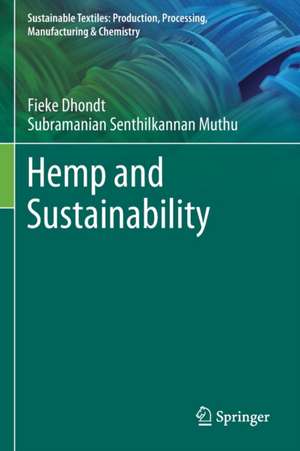Hemp and Sustainability: Sustainable Textiles: Production, Processing, Manufacturing & Chemistry
Autor Fieke Dhondt, Subramanian Senthilkannan Muthuen Limba Engleză Paperback – 13 iul 2022
| Toate formatele și edițiile | Preț | Express |
|---|---|---|
| Paperback (1) | 576.09 lei 6-8 săpt. | |
| Springer Nature Singapore – 13 iul 2022 | 576.09 lei 6-8 săpt. | |
| Hardback (1) | 888.49 lei 6-8 săpt. | |
| Springer Nature Singapore – 12 iul 2021 | 888.49 lei 6-8 săpt. |
Din seria Sustainable Textiles: Production, Processing, Manufacturing & Chemistry
- 24%
 Preț: 778.71 lei
Preț: 778.71 lei - 18%
 Preț: 726.37 lei
Preț: 726.37 lei - 20%
 Preț: 567.99 lei
Preț: 567.99 lei - 20%
 Preț: 692.85 lei
Preț: 692.85 lei - 18%
 Preț: 790.28 lei
Preț: 790.28 lei - 18%
 Preț: 1002.61 lei
Preț: 1002.61 lei - 18%
 Preț: 951.29 lei
Preț: 951.29 lei - 18%
 Preț: 781.62 lei
Preț: 781.62 lei - 18%
 Preț: 895.45 lei
Preț: 895.45 lei - 15%
 Preț: 583.93 lei
Preț: 583.93 lei - 15%
 Preț: 694.04 lei
Preț: 694.04 lei - 15%
 Preț: 637.46 lei
Preț: 637.46 lei - 15%
 Preț: 575.77 lei
Preț: 575.77 lei - 15%
 Preț: 578.05 lei
Preț: 578.05 lei - 15%
 Preț: 637.78 lei
Preț: 637.78 lei - 15%
 Preț: 579.34 lei
Preț: 579.34 lei - 15%
 Preț: 701.72 lei
Preț: 701.72 lei - 15%
 Preț: 642.64 lei
Preț: 642.64 lei - 18%
 Preț: 948.79 lei
Preț: 948.79 lei - 15%
 Preț: 575.09 lei
Preț: 575.09 lei - 15%
 Preț: 696.68 lei
Preț: 696.68 lei
Preț: 576.09 lei
Preț vechi: 677.75 lei
-15% Nou
Puncte Express: 864
Preț estimativ în valută:
110.27€ • 119.82$ • 92.69£
110.27€ • 119.82$ • 92.69£
Carte tipărită la comandă
Livrare economică 21 aprilie-05 mai
Preluare comenzi: 021 569.72.76
Specificații
ISBN-13: 9789811633362
ISBN-10: 9811633363
Pagini: 123
Ilustrații: IX, 123 p. 16 illus., 11 illus. in color.
Dimensiuni: 155 x 235 mm
Greutate: 0.2 kg
Ediția:1st ed. 2021
Editura: Springer Nature Singapore
Colecția Springer
Seria Sustainable Textiles: Production, Processing, Manufacturing & Chemistry
Locul publicării:Singapore, Singapore
ISBN-10: 9811633363
Pagini: 123
Ilustrații: IX, 123 p. 16 illus., 11 illus. in color.
Dimensiuni: 155 x 235 mm
Greutate: 0.2 kg
Ediția:1st ed. 2021
Editura: Springer Nature Singapore
Colecția Springer
Seria Sustainable Textiles: Production, Processing, Manufacturing & Chemistry
Locul publicării:Singapore, Singapore
Cuprins
Introduction.- The environmental and social impacts of hemp.- Optimal conditions for hemp fibre production.- Climate change impact on hemp.- Climate adaptation.- Future sustainable performance of hemp.- Sustainable hemp products.- The future of hemp in the fashion industry.
Notă biografică
Fieke Dhondt graduated Cum Laude with a BSc in Fashion and Textile Technologies at the Amsterdam Fashion Institute and continued studying for MSc Sustainable Business and Innovation at the Faculty of Geosciences at Utrecht University. Her bachelor's thesis was regarding the future of hemp fibres under changing climate conditions. Furthermore, she contributed to a new sustainability strategy for a multinational by conducting research in Bangladesh, China and Hong Kong.
Dr. Subramanian Senthilkannan Muthu holds a PhD in Textiles Sustainability and has written around 100 books and 100 research publications. He is well known for his contributions in the field and has extensive academic and industrial experience. He is the Editor-in-Chief of the Textiles & Clothing Sustainability Journal.
Dr. Subramanian Senthilkannan Muthu holds a PhD in Textiles Sustainability and has written around 100 books and 100 research publications. He is well known for his contributions in the field and has extensive academic and industrial experience. He is the Editor-in-Chief of the Textiles & Clothing Sustainability Journal.
Textul de pe ultima copertă
This book highlights the positive and negative impacts that hemp fibre and textiles have on environment, while studying the effects of climate change on the growth of fibre hemp. Human-induced climate change challenge the availability of textile fibres, whereas today’s apparel industry leaves behind a substantial environmental footprint. Sustainable hemp textiles can lighten it. The book describes the environmental impact of hemp and how climate change influences future hemp growth. Hemp is considered in most literature as a sustainable alternative for the commonly used fibres polyester and cotton. However, most research does not go farther than the environmental impacts of hemp, and there is currently a lack of knowledge/literature that examines the possibilities of hemp growth under changing climate conditions.
Caracteristici
Highlights how hemp could be a sustainable substitute to alleviate the environmental and social impacts of commonly used textile fibres Examines the environmental footprint and social impacts of hemp textile(s) Uses climate analysis to determine the impact of climate change on hemp textiles and assess the possibility for future use
